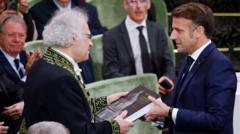In a grand ceremony at the historic Collège des Quatre-Nations, the ninth edition of the Dictionnaire de l’Académie Française was finally presented to President Emmanuel Macron, marking a significant yet contentious milestone in the evolution of the French language. This edition, produced by an esteemed group of 40 scholars known as the "immortals," aimed to mirror modern linguistic developments since the 1950s, yet has drawn skepticism over its sluggish pace.
The journey to complete this comprehensive dictionary began over four decades ago, producing sections iteratively. With its last entry (Zzz) now added, the Academy emphasizes that the dictionary boasts an expansive array of 21,000 new terms. However, many critics contend that by the time this edition was published, some of the modern words incorporated were already old news, highlighting the challenge of keeping pace with the rapid evolution of language.
Common contemporary terms such as "tiktokeur," "vlog," and "smartphone" are notably missing, raising concerns about the dictionary's viability as a contemporary reference. The critics argue that while the Academy's dictionary may hold cultural significance, it pales in comparison to more agile online resources that can adapt and grow with the language.
Moreover, critiques extend to the definitions and inclusivity found within the new dictionary. While it embraces the feminization of job titles, the entry for marriage continues to reflect traditional views, ignoring modern legal definitions prevalent in contemporary France. This contradiction has led some linguists to question how relevant this linguistic endeavor truly remains for future generations.
As discussions for the forthcoming tenth edition begin under the leadership of Amin Maalouf, the Academy faces an uphill challenge to remain pertinent in a world where linguistic trends are transformed almost daily. The debate continues about whether venerable institutions like the Académie Française can effectively captivate a generation increasingly reliant on digital platforms for instant language reference and adaptation.





















